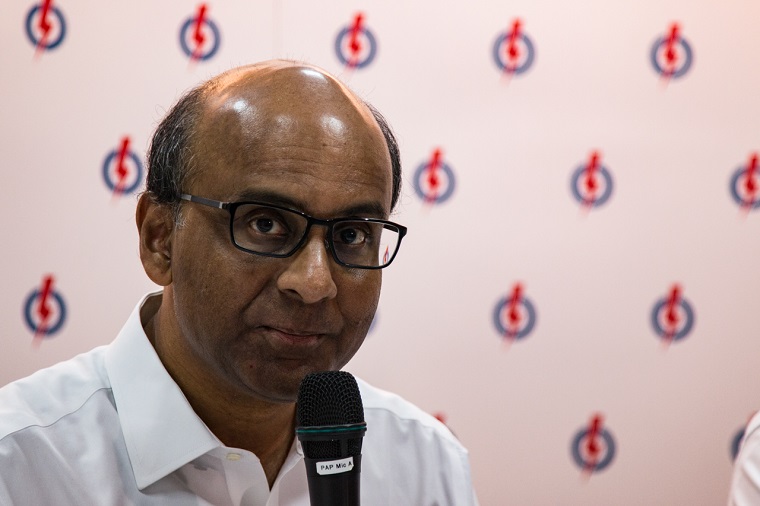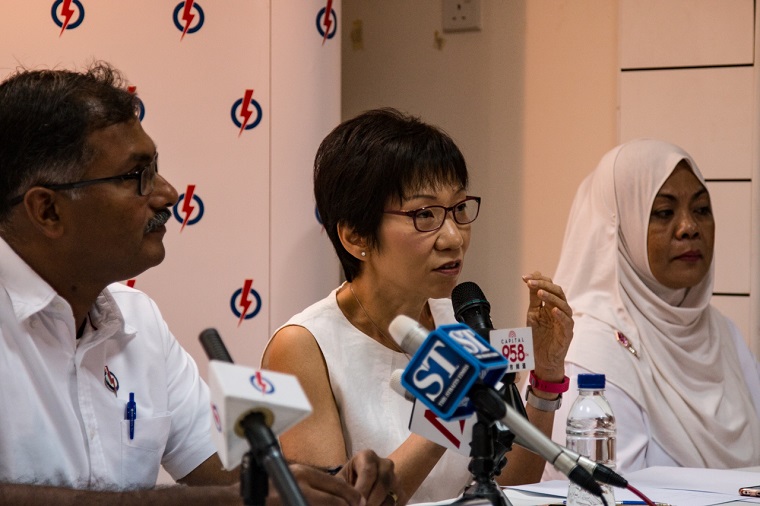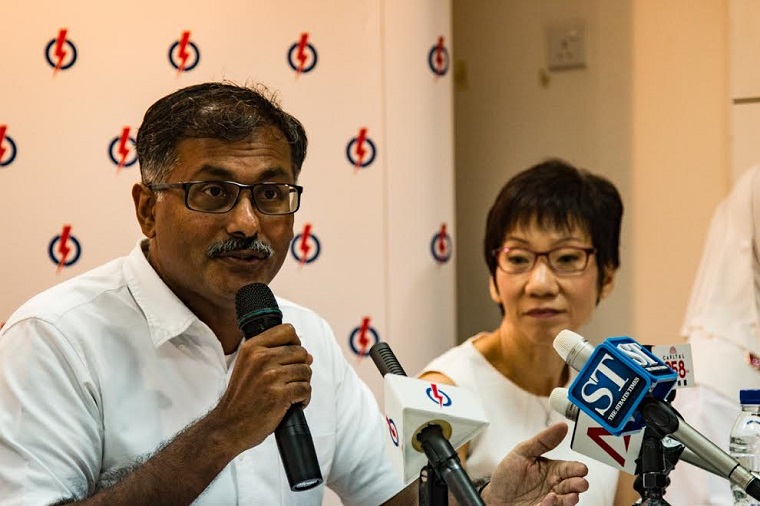People’s Action Party (PAP) candidate Murali Pillai launched his party’s plans with an emphasis for the elderly and poor in Bukit Batok today (Apr 26), ahead of Nomination Day tomorrow.
His plans included giving aid to the retrenched and unemployed with help from community volunteers, setting up a health cooperative which would assist families and communicate medical information to prevent disease, as well as an emergency button scheme, which would allow the elderly to call for help.
These plans echo much of what Murali set up in Paya Lebar - where he set up two mobile clinics, and instituted a panic button fund.
Here are five observations from the PAP’s press conference announcing Murali’s plans:
1. The upgrading 'carrot-and-stick' approach
Over the weekend, media reports carrying Murali's comments on the $1.9 million Neighbourhood Renewal in Bukit Batok seem to give the impression to some Singaporeans that it would not be happen if Murali was not elected.
This was the previous statement on The Straits Times that raised eyebrows:
"This plan we are presenting is a plan by the PAP Jurong-Clementi Town Council. So it's really up to our residents. We will only have the mandate to carry on if we are returned at the next by-election. If we don't have the mandate then we won't have the ability to carry on, because we will not form the town council ... That's the rules."
In today's press conference, Murali and DPM Tharman Shanmugaratnam clarified that NRPs were fund-neutral projects. Whoever runs the town council would have access to the funds to execute upgrading.
Both DPM Tharman and Murali then said that the PAP-led town councils had the track record in these matters.
2. Resident feedback key to this campaign
Both the PAP and the opposing Singapore Democratic Party (SDP) have both emphasised that their plans - essentially election promises at this point - were created after feedback from residents.
There was a huge emphasis on listening to residents by Murali - which paralleled SDP's Chee Soon Juan’s comments when it came to convincing voters.
Murali emphasised that a number of his plans - implemented on top of current government-funded proposals were done after listening ‘very carefully’ to residents. “These are all fresh ideas - to deal with the evolving needs of Bukit Batok residents,” he said.
He added that he would spend the next few days explaining to Bukit Batok residents his plans for them so as to get their endorsement. “Hopefully they will support it (my plan) and I will be in a position to implement it, always listening to them for the betterment of the Bukit Batok residents, to create better homes, and to have a brighter future for them.”
To recap, on Friday (Apr 22), Chee said that his party’s plans were things that came out of feedback to them. "We’ve been putting our ears to the ground, and basically looking and assessing what their needs are,” Chee had said.
3. On the impact of the by-election effect
When fielding a media query on the by-election effect, DPM Tharman said that the by-election effect was "very real".
The PAP will start at a disadvantage come Nomination Day tomorrow, as the notion that the PAP will still form the government regardless of the by-election's result may mean voters can "risk" voting in an opposition candidate.
Thus, Murali stressed his the benefits that comes with his ties to the Bukit Batok community as well as his professional contacts.
Murali said that he would push hard for policies to help the retrenched and unemployed in Parliament, as well as increase the payouts lower-income elderly residents will get.
“Every Singaporean who needs a job should get a job - and it’s not just an issue of rolling out policies, but it’s an issue of implementing it properly to make sure that it is genuinely felt,” he said. “So if I’m elected, I would want to push hard for these policies, to make sure that the full impact is felt.”
The election was also a comparison of both parties’ social initiatives and their feasibility. DPM Tharman told the press that the social initiatives laid out by both parties are also dependent on the volunteers both parties had.
"What happens after the elections depends on the volunteers as well … the strength of the volunteer base, their motivations and their track record in serving residents," DPM Tharman said. "I like the fact that the SDP’s bringing in some new volunteers. But we’ve got something going here, a very strong volunteer base."
4. Addressing SDP's comments on PAP not consulting residents on the NRP
The SDP responded to Murali’s plans for a three-generation park and sheltered walkways, and a jogging track conducted through the Neighbourhood Renewal Programme (NRP) by attacking the PAP’s apparent lack of consultations with residents. “It’s easy to propose things just before an election comes,” Chee said.
In response DPM Tharman said that the Neighbourhood Renewal Programme had already been through public consultations. “There’s no need to begrudge the PAP for having done its consultations already, having developed plans and having now announced plans for further consultations… The (PAP-led) Town Council started its consultations on this latest Neighbourhood Renewal Programme several months ago, developed the plans - not just developed plans in response to residents’ feedback, but also changed the plans after the first draft, in response to residents’ feedback.”

Murali said that the Jurong-Clementi Town Council - which Bukit Batok would remain if Murali is voted MP - would be the best at implementing the NRP, a HDB-funded program.
"I have full confidence that the Jurong-Clementi Town Council would do an excellent job,” Murali said. DPM Tharman added that Bukit Batok had been given a higher priority than the rest of the seven wards in Jurong-Clementi - five out of 15 NRPs that were implemented in the Town Council were done in Bukit Batok. That, combined with a ‘decent track record’, gave Jurong-Clementi Town council two advantages, DPM Tharman added.
"In fact (our strategy) reflects what Mr Murali put in his manifesto,” Tharman said. "One for all, all for one. We serve the whole set of neighbourhoods, but we do it fairly, and we give additional resources where the needs are greatest.”
5. Grace Fu reiterated that Murali had support as a minority candidate

Minister for Culture, Community and Youth Grace Fu - MP for Yuhua SMC, adjacent to Bukit Batok SMC - said that Murali enjoyed support from volunteers and activists, and could thus cross the language barrier. This was in response to a query from the media on whether Murali, being a minority candidate, would be disadvantaged because of it.
Fu cited Murali’s performance in Aljunied - particularly in the ward he contested, Paya Lebar - which was 84% Chinese.
"I have full confidence that he’s able to win the trust and the support of the constituency in Bukit Batok,” Fu said. "For him to have a very good result in a predominantly Chinese (ward) - by far above national average - I think it’s a very good testament of his ability to cross the language barrier to reach out to Chinese constituents.”
Photographs by Ng Yishu
If you like what you read, follow us on Facebook and Twitter to get the latest updates.
If you like what you read, follow us on Facebook, Instagram, Twitter and Telegram to get the latest updates.
